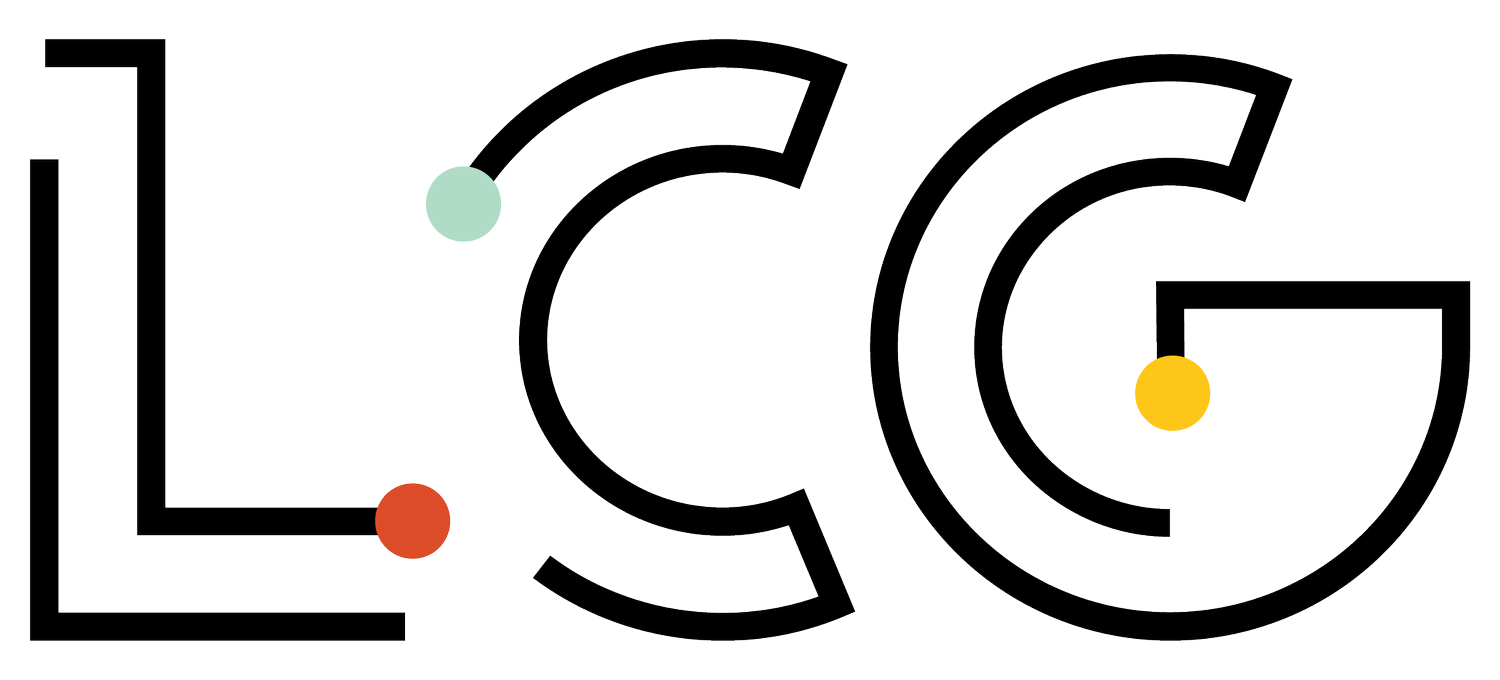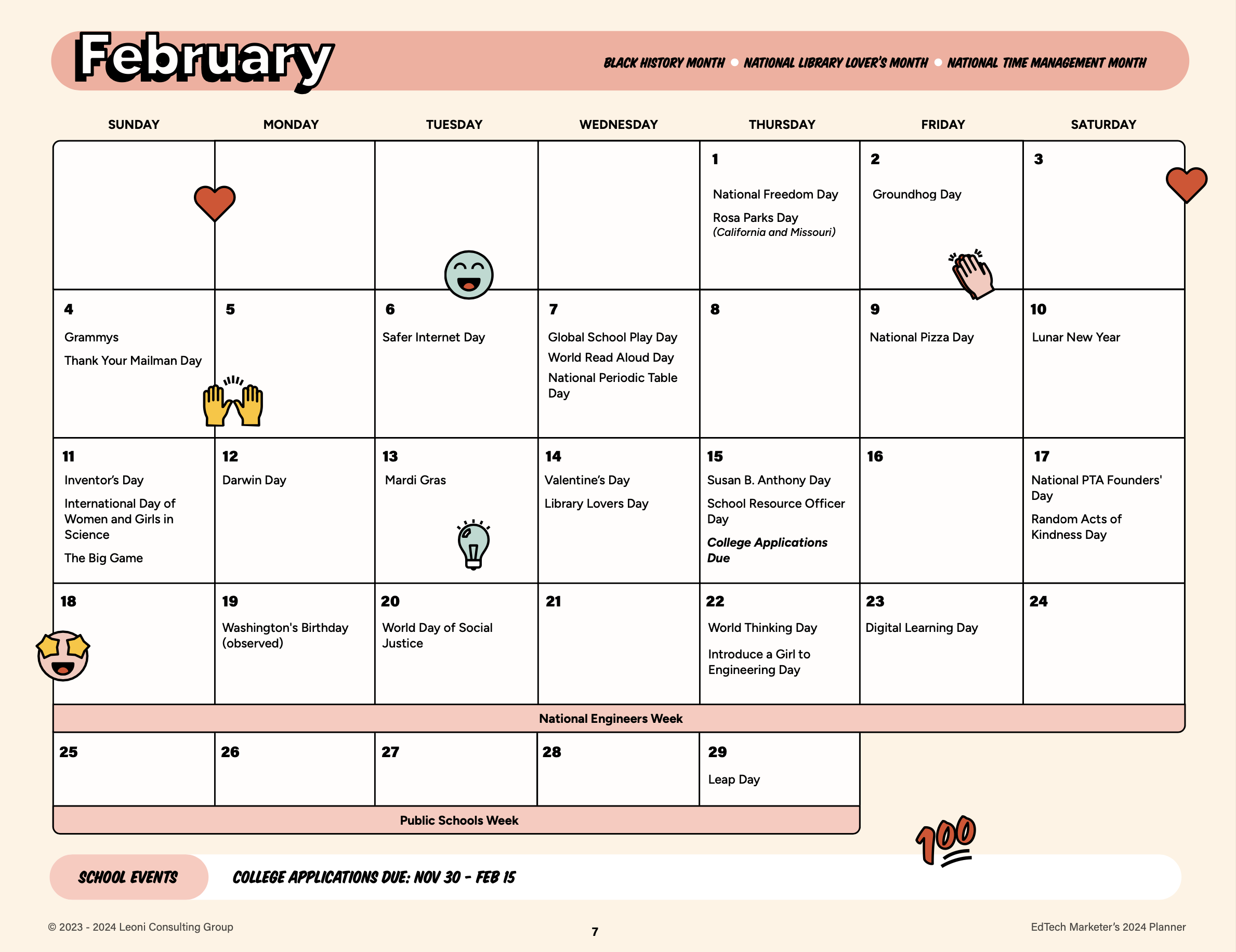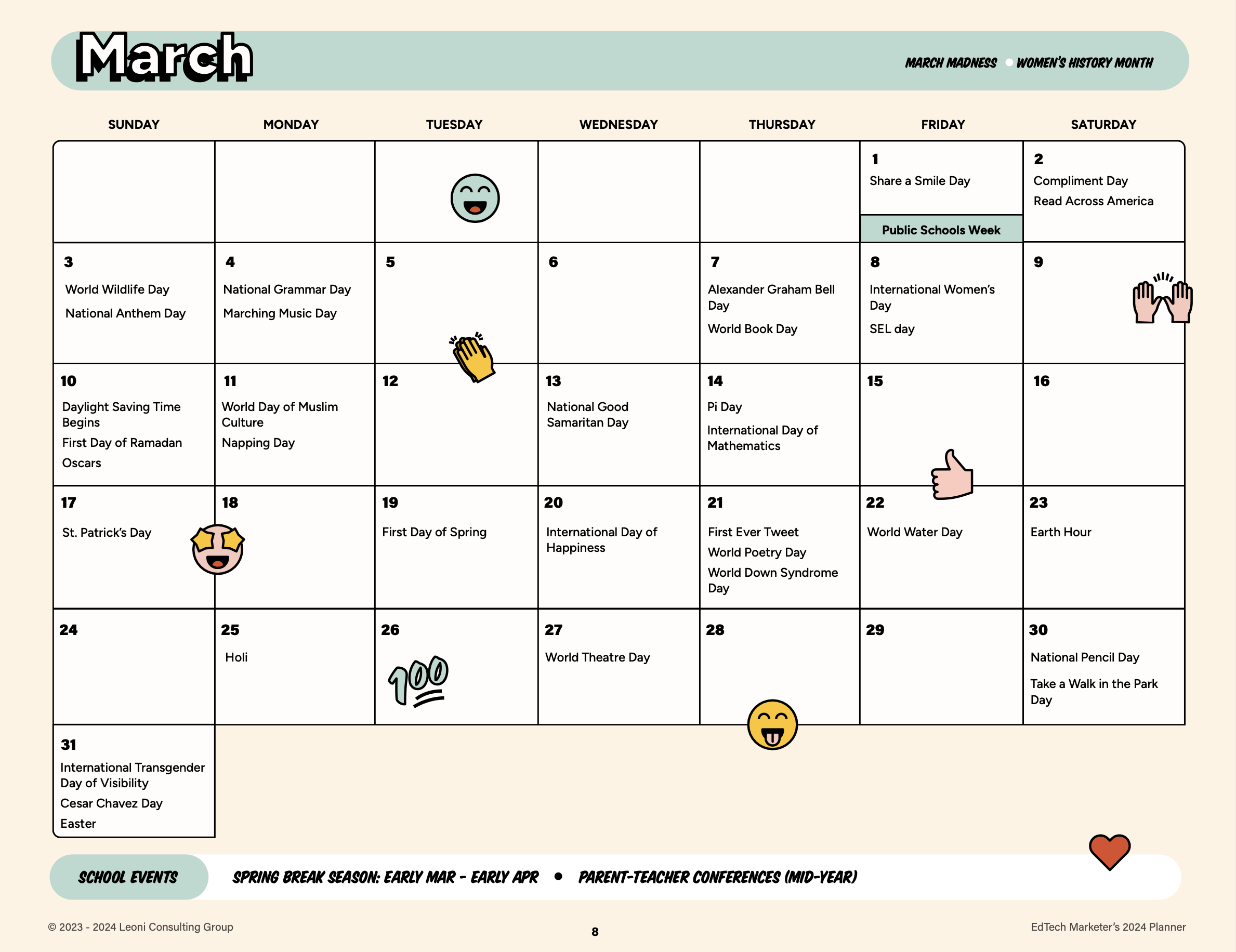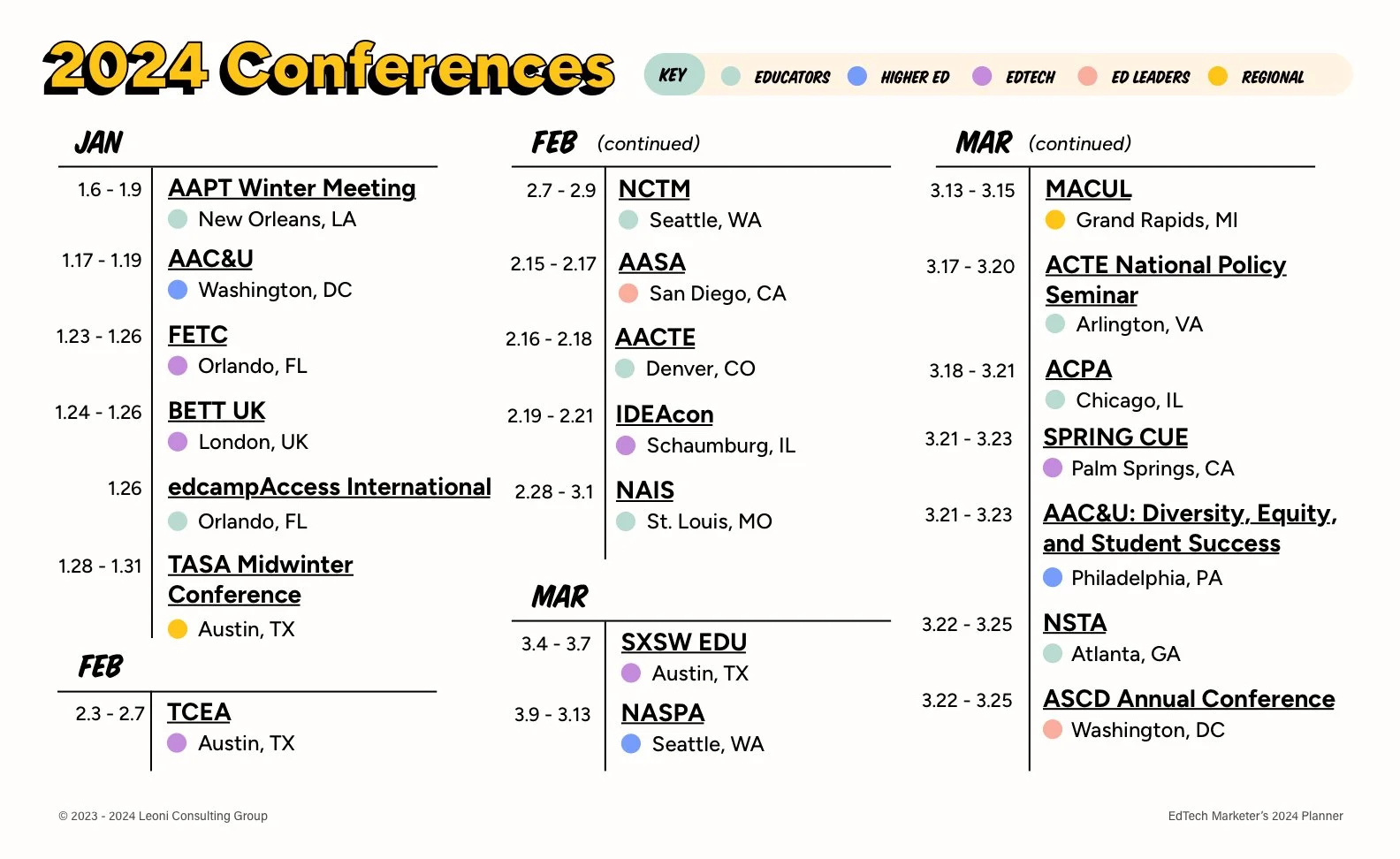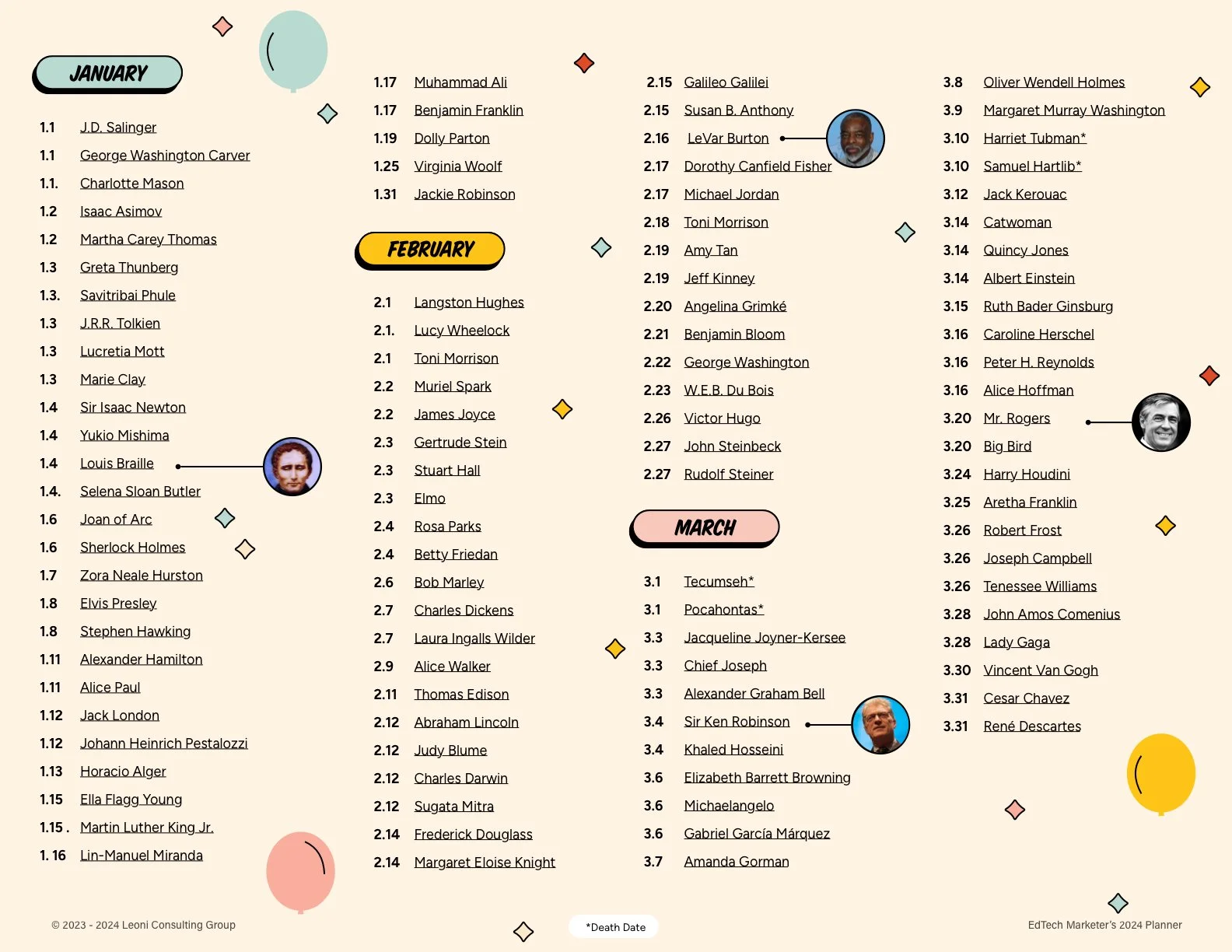The first quarter of 2024 is in full swing. Have you had time to set your brand’s content and social media strategy yet? If you’re like many, you may be just scrambling to keep up with everything happening this quarter. In education, Q1 is packed with conferences (scroll to get a list of of the conferences in K-12 and higher education), goal setting, and hopefully planning.
Whatever your 2024 EdTech marketing goals and content may be, this post can help. It includes key education holidays, events, and conferences in the first quarter of 2024 (January - March). We’ve also included some content ideas and insight into the K-12 EdTech Buying Cycle that can help you ensure your marketing and sales efforts are the most successful as they can be.
Shameless Plug: Make sure to download our free EdTech 2024 Marketer's Planner that includes all of these events mentioned below and much more.
Want to be the first one notified when we launch these free blog posts? Sign up to our email list to receive quarterly notifications:
K-12 Education Holidays, Events, and Conferences
We've listed some of the most important dates EdTech marketers should consider throughout the first quarter and brainstormed timely content ideas that speak to some themes that align with school and district administrators and teachers top needs and challenges during these months.
Friendly piece of advice: You may be tempted to jump right in and select the events you’d like to focus on for your marketing, social media, and content campaigns, but before you do, make sure that the events you select also align with your overall marketing strategies and business needs (what we call the magic in the middle — the alignment of business needs, audience needs, and organizational capacity/budget).
January
Holidays and Observations: National Mentoring Month, National Thank You Month, No Name-Calling Week, National Handwriting Day, International Day of Education, National Data Privacy Day
Administrators: January begins the consideration and trial phase of the K-12 education purchasing cycle. Informed by prior performance data and current student learning needs, district and school administrators extensively explore and evaluate available solution providers and options. This is your time to shine. Offer detailed information, case studies, and trial opportunities to showcase the strength and effectiveness of your solutions. Build trust through ongoing support, content sharing, and personalized interactions. Share how administrators and schools have found success with your product when possible. Remember that January is the mid-point of the academic year, and teacher burnout is a stark reality for many. Admin may be leading a staff who may be barely hanging on. Show them how your easy-to-use, effective, and innovative product will lighten their load, improve experiences, and inspire learning.
According to a recent Agile survey, educators evaluate potential solutions with a core set of criteria:
25% want to see examples of use in other districts/schools
34% want implementation details
37% want to know all the features, bells, and whistles
38% want to understand the key benefits of the specific solution
53% want to know the full extent of all associated costs
57% want evidence of success
As schools embark in meticulous evaluation, your role is to build trust through ongoing support, personalized content, and strategic interactions. How can your solutions meet the criteria schools are seeking? Provide detailed information, case studies, and trial opportunities to showcase your strengths, understanding that success in this phase solidifies your advancement to the purchasing phase.
Teachers: January can bring mixed feelings in the classroom. At the halfway mark for the academic year, many teachers are hitting their stride: they've built a cohesive learning community, forged relationships with their students, and understood what does and doesn't support their learning. For those teachers, the new year may bring fresh energy.
For some, January brings a new wave of pressure. Testing and benchmarks loom. Progress may stall or even revert. These teachers seek breakthroughs – opportunities to rethink current strategies, leverage technologies and tools, and increase engagement, interest, and excitement. Others may find their attention waning and see the new year as a fresh start. Use January to ensure top-of-mind-awareness. Make sure your brand and product are recognized as a solution. Share resources or tools that can provide quick wins. Offer opportunities for quick and easy onboarding. Find ways to give connections – be it solidarity or accountability, community creates success. Remember - regardless of where the educator is at, if your EdTech product or service requires additional time from the teacher, you need to make a solid case why this extra time will be worth it and ideally, how this invested time will actually save them time in the long run.
February
For a lot of the U.S., February marks the final stretch of dark and dreary times of winter. While educators know that the light is coming (known as Spring break), it can feel like it is so far away, as they wrap up the winter months and head into the end of the year. State testing is also right around the corner, which means lessons are mostly curtailed to test-taking strategies and content, and it's not the most fun for students or teachers. Take the time to pause your product-marketing efforts and recognize that teachers want to feel seen and validated. This is a great time to share how your product or service can engage students. Share other quick-and-easy wins that apply to their current classroom challenges, and have fun!
Holidays and Observations: Black History Month, National Library Lover’s Month, Safer Internet Day, World Read Aloud Day, Groundhog’s Day, Valentine’s Day, Mardi Gras, Washington’s Birthday (Observed), Leap Day
Administrators: This month, speak to administrators about the benefits of your product, specifically highlighting value. Celebrate and highlight black voices (this could be related to efficacy or not). Given high burnout, surface up ways to help admins support their staff, teachers, and students.
Teachers: Highlight powerful Black stories and quotes and share Black History Month resources, books, and movies. To complement Valentine's Day, you could provide social and emotional learning, kindness and empathy, and kindness resources. Speaking of love — there is also a great time to spread your love and appreciation for educators. Don't forget that it's National Time Management Month, and one thing educators never have enough of is time. Highlight any time-saving methods or tips you have.
An important note: Black History Month is a monthlong focus on the Black heroes and pioneers who have shaped our world, but it also spotlights the importance of being an ally to marginalized communities — not for just this month but for all 365 days in a year.
March
Spring arrives in March, and along with it, a much-needed spring break. Compared to February, teachers can celebrate many more events in their classrooms: March Madness, St. Patrick's Day, Pi Day, and more. It is also National Women's History Month and a great time to highlight the significant historical contributions of women. Overall, March offers more sunshine and hope that the end of the year is indeed coming. Despite this, many schools will continue their state standardized testing preparation. So, inject fun and student engagement strategies as much as you can.
Holidays and Observations: March Madness, Women’s History Month, Ramadan, St. Patrick’s Day, Pi Day, First Day of Spring, Holi, Easter
Administrators: Spring can provide an opportunity to weave in themes such as spring cleaning and organizing. In the education world, the pivot to looking into the upcoming school year has already begun. Administrators will hold interviews and change schedules/assignments to prepare for the next school year. To complement International Happiness Day, surface up highlight fun team-building activities that foster staff happiness and inclusion. Always try and help admins support their school’s and district’s educators and staff as much as possible. Administrators will also be tweaking schedules to ensure that the entire building can test according to the many stipulations that go along with administering these types of high-stakes test. Purchasing-wise, it's also a good opportunity to speak to administrators about district case studies that have improved from using your product/service.
Teachers: Spring can be a good time to start talking about outdoor appreciation, learning, and possibly the benefits of school gardens. Celebrate Women's History Month by highlighting famous/important women in history. During this month, teachers might also be meeting with parents to go over specific goals that need to be met to ensure the best academic success of their students. This can also be a time when teachers may need resources to use with students to help with their mental well-being while taking these high-stakes state tests.
Conferences
Conferences can be a great opportunity for EdTech brands, education leaders, and educators to connect and learn from each other. Q1, especially March, is one of the busiest conference months in 2024. In terms of reach, the biggest EdTech-forward conferences of the quarter are FETC, TCEA, SXSWEdu, and BETT (UK). If you want to prioritize connecting with a school leadership audience, put AASA , ASCD, and CoSN on your radar. Plus, there are great conferences that are subject and school-type specific, such as NSTA (science), CATE (California English), and NAIS (Independent schools).
We’ve linked these conferences below so you can easily explore:
January
1.6-1.9, AAPT Winter Meeting, New Orleans, LA
1.17-1.19, AAC&U, Washington, DC
1.23-1.26, FETC, Orlando, FL
1.24-1.26, BETT UK, London, UK
1.26, edcamp access international, Orlando, FL
1.28-1.31, TASA Midwinter Conference, Austin, TX
March
3.4-3.7, SXSW EDU, Austin, TX
3.9-3.13, NASPA, Seattle, WA
3.13-3.15, MACUL, Grand Rapids, MI
3.17-3.20, ACTE National Policy Seminar, Arlington, VA
3.18-3.21, ACPA, Chicago, IL
3.21-3.23, Spring CUE, Palm Springs, CA
3.21-3.24, AAC&U, Washington, DC
3.22-3.25, ASCD Annual Conference, Washington, DC
Birthdays
Celebrating birthdays of historical figures or famous people most aligned to education and learning can be a great way to inject much-needed fun and engagement during a quarter marked with dark days and standardized testing prep.
First, figure out which birthdays your audience would want to celebrate, and then plan content around them. Learn three ways you can incorporate birthdays into your content plans. If you’re not sure of what your audience would most likely care about – ask them. Start some conversations, run surveys, launch polls, or ask questions on social media and in your community (text posts work great for this). This hands-on approach ensures your content will align with what your audience is most excited about.
The following list and image highlights some of the most relevant birthdays for learning and education.
As we wrap up this whirlwind tour of Q1 2024 in K-12 education, if you do nothing else, make sure to align your content and social media campaigns to the K-12 Buying Cycle and always plan with the utmost value in mind for your target audience. In January, dazzle school and district administrators with trial offers and show teachers how your EdTech product or service can help solve their most-pressing challenges. February is about recognizing teacher efforts and highlighting your product's value for administrators. March brings a breath of fresh air as teachers get a much-needed break and administrators begin to prep for the next school year.
Q1 is also one of the busiest quarters for conferences for teachers and school leaders. As you decide on what content to create, birthdays can add a touch of joy. Celebrate historical figures and famous birthdays aligned with education based on your audience's preferences.
Our 2024 EdTech Marketer's Planner is your go-to map, providing insights into the most important events, birthdays, conferences, and content ideas. 🚀
This post was written in collaboration with Elana Leoni, Brianna Henneke Hodges, Stevie Frank, and Jordan Moldenhauer.
